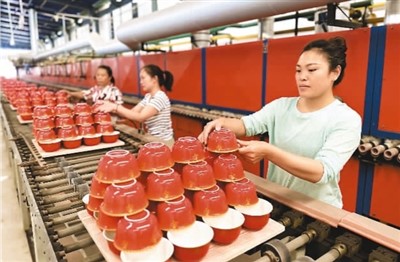China sees high-quality development of private sector
The 7th China Private Enterprise Cooperation Conference was recently held in Wuhan, capital of central China's Hubei Province.
A total of 103 deals worth more than 108 billion yuan ($15.2 billion) were inked at the event, covering fields such as next-generation information technology, automobile manufacturing and services, and health and biotechnology, which demonstrated the vitality of the country's private economy.

Employees work at a private porcelain workshop in Wangyang town, Renshou county, Meishan city, southwest China's Sichuan Province. (People's Daily/Pan Shuai)
Analysts pointed out that China will see stronger momentum for the high-quality development of its private sector, thanks to the implementation of more favorable policies.
China's private economy contributes over 50 percent of tax income, over 60 percent of GDP, over 70 percent of technological innovations, and more than 80 percent of urban jobs.
By the end of March, the number of registered private enterprises in China had exceeded 49 million, accounting for 92.3 percent of the country's total, according to data from the State Administration for Market Regulation.
Multiple regions across the country have recently held activities and rolled out measures to boost the development of the private sector.
Shanghai, for instance, unveiled a 20-point measure to support private-sector investment, including lowering land costs, expanding financing channels for private enterprises and supporting private investment in technological innovation.
East China's Anhui Province issued measures to beef up support to self-employed businesses, including reducing their production and operating costs, easing the burden of taxes and fees on them, and providing efficient and quality public services.
Data from the State Taxation Administration showed that between January and April, China's tax refunds, tax and fee cuts, and tax and fee deferrals reached 468.9 billion yuan, including over 339.3 billion yuan for private enterprises and self-employed businesses.
Private enterprises have made efforts to thrive. Beiang Air Tech Ltd., a private company based in Suzhou city, east China's Jiangsu Province, has reached overseas markets including Japan and Germany with its quality products by leveraging cross-border e-commerce platforms, said Zhang Yan, founder of the company and general manager of its overseas business department.
"Our exports account for 80 percent of our products," Zhang said, expressing her full confidence in the company's long-term development thanks to favorable policies. "We aim to achieve an annual sales growth of more than 20 percent this year," she said.
Chinese carmaker Seres saw its 100,000th Aito vehicle roll off the assembly line in its plant in southwest China's Chongqing Municipality on May 27. It took Aito 15 months to produce 100,000 vehicles, making the brand the fastest-growing new energy vehicle marque.
"Private enterprises need to rely on technological innovation to foster new strengths. As a private entrepreneur who has been engaged in manufacturing for a long time, I'm confident in the prospects of the high-quality development of China's automobile manufacturing industry," said Zhang Xinghai, founder of the Seres Group.
To achieve high-quality development, private enterprises need to make every effort to innovate in technology and business models, and strengthen brand-building, said Ding Zuohong, chairman of the board of directors of Yuexing Group in Shanghai.
Photos
Related Stories
- Chinese regions roll out effective policies to promote high-quality development of private sector
- China promotes healthy, high-quality development of private sector
- China to encourage, support private sector
- China has robust, large, fast-growing private sector: PIIE
- Private gauge confirms factories strong in June
Copyright © 2023 People's Daily Online. All Rights Reserved.









